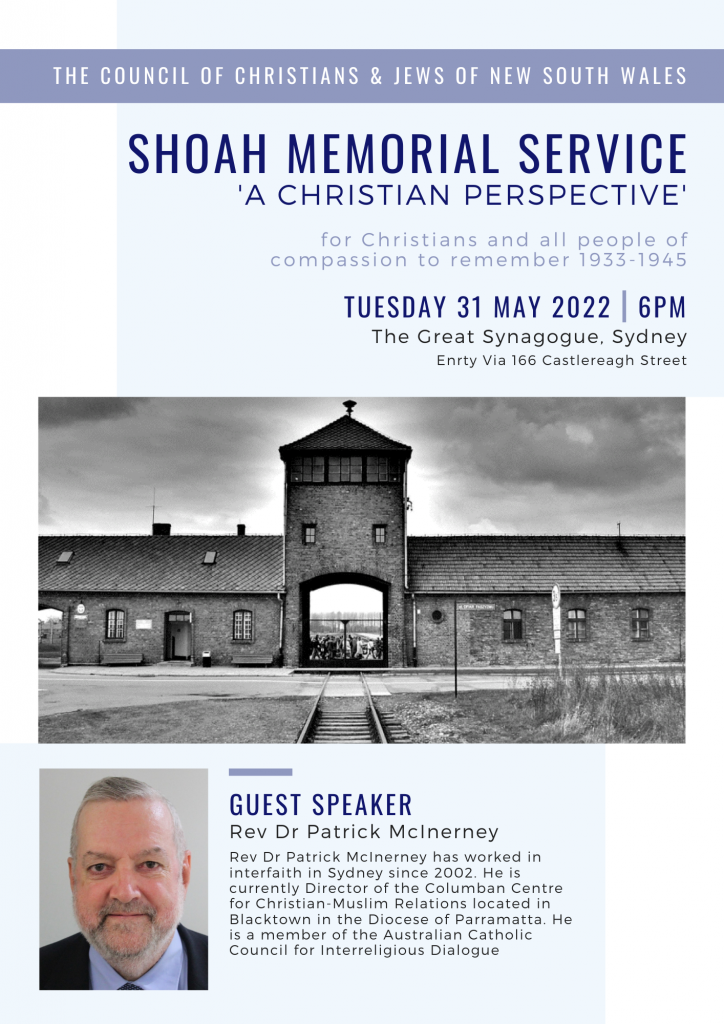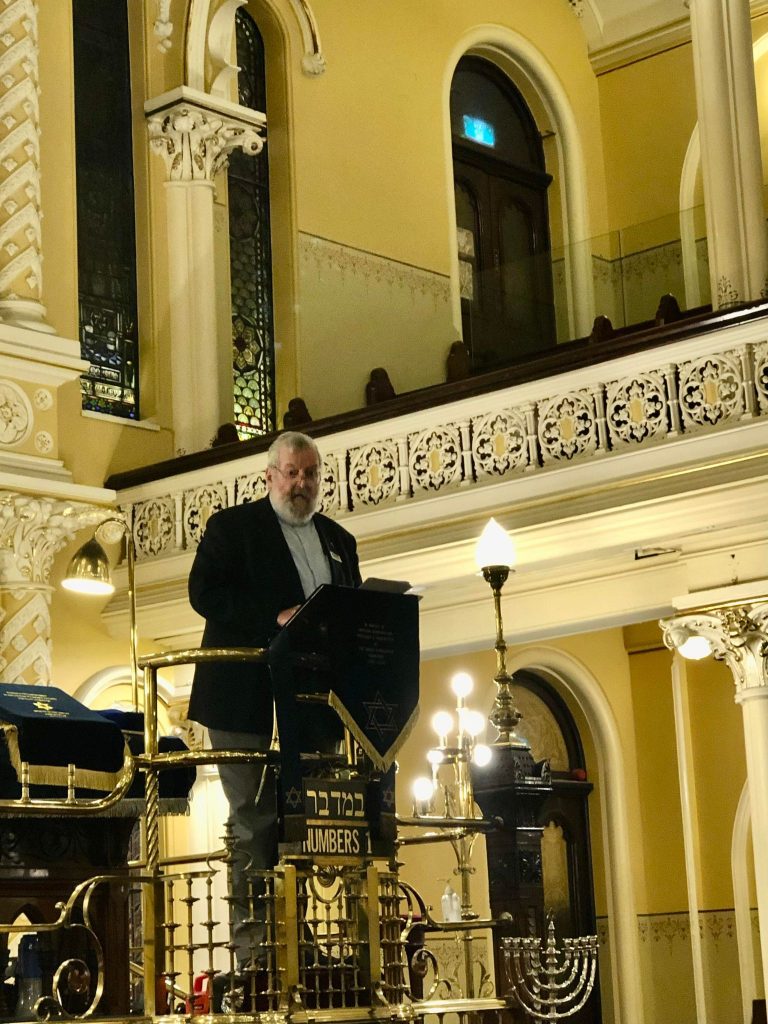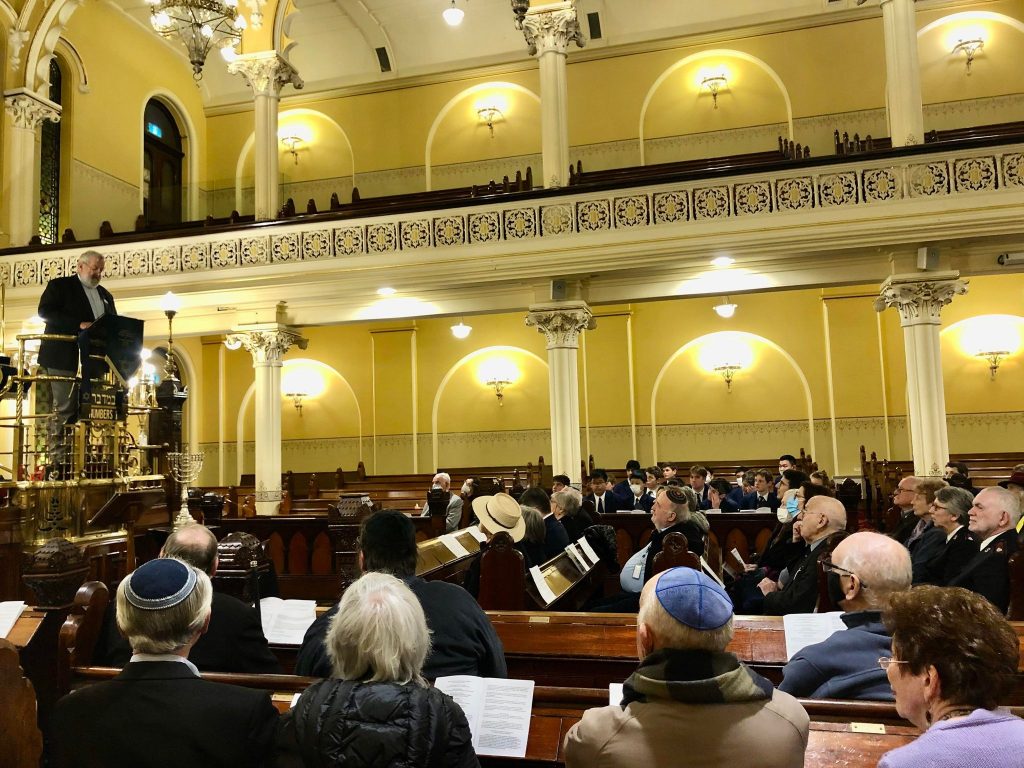Shoah Memorial Address
Patrick McInerney
 Our changing Church: A Columban priest’s journey
Our changing Church: A Columban priest’s journey
Teresa Pirola
The Church changes over time. Sometimes dramatically, in the public eye; and, more often, in small steps taken in everyday private lives.
Both kinds of ecclesial evolution were evident in a quietly pioneering keynote address delivered by Columban missionary priest, Fr Patrick McInerney, at The Great Synagogue in Sydney on the night of 31 May 2022.
Stepping up to the pulpit for the Annual Shoah Memorial Service hosted by the Council of Christians and Jews of New South Wales, Patrick was acutely aware of speaking from a place that, for the most part, had belonged to the voices of Holocaust survivors and their descendants who had previously shared their stories, memories and reflections at this time-honoured event. As a Catholic priest, what could he offer such a sensitive occasion?
“It was a daunting challenge and a great responsibility,” recalls Patrick. “I chose to approach the task in an autobiographical way. What I shared was a kind of ‘conversion’ story, a journey of growth.”
Patrick’s story began with a description of his early Catholic life. Growing up on a farm in South Australia, in an Anglo-Christian bubble, he knew nothing of Judaism. He went on to become a Columban priest, studying Arabic and Islam in Rome and spending a 20-year appointment in Pakistan, a 96% Muslim-majority country. He was being introduced to the world of interfaith relations, yet at this time Jews and Judaism remained unknown to his life’s path.
“In late 2002 I was appointed to the Columban Centre for Christian-Muslim Relations in Sydney. It was at the Abraham Conference that I first met a Jew – and my long overdue remedial work began.
“I had often attended Friday prayers in mosques – but had never been inside a synagogue. I asked a Jewish friend who kindly invited me to a Shabbat Service. As I sat in the congregation, it struck me that Jesus would have felt ‘at home’ here, whereas I, his follower, felt like a stranger.”
At this point, the Jewish Scripture scholar Amy-Jill Levine enters the story.
“I was shocked by Levine’s statement, ‘Jesus lived and died a faithful Jew’,” recalls Patrick. “I also learned about the harmful effects of anti-Jewish stereotypes in Christian preaching down through the ages, and which still occur. These include a Jesus removed from his Jewish context, cast as a freedom-loving revolutionary against the fabricated foil of legalistic Judaism; and where ‘Good Samaritan’ implies ‘bad Jew’! I was mortified to recognise that I too had occasionally committed such inadvertent blunders.
“But I was privileged to have guides, Christians and Jews, who took me and led me by the hand, some of whom became friends.”
Insightfully and humbly, Patrick continued to walk a newfound path of Jewish studies, Jewish-Christian encounter and personal reflection, including a visitation in Rome to the graves of three ground-breaking Popes which he undertook as “a personal Jewish-Christian pilgrimage in reparation for my mistakes, and in profound gratitude for the conversion I had undergone in more recent years.”
The interfaith legacy of these three Popes – John XXIII, Paul VI and John Paul II – were interwoven with the telling of his own journey and, in this way, Patrick gave voice to another conversion story: that of the Catholic Church coming to grips with its long history of anti-Judaism, its amnesia towards Christianity’s Jewish roots, the confronting truth of the Holocaust and, finally, the decisive turning point of the Second Vatican Council where a new teaching of respect for the Jewish people was forged.
As I listened to Patrick that night in The Great Synagogue, it struck me that his address was a powerful remembering of the Council itself.
If, as one conciliar expert described it, Vatican II’s approach to Jewish-Christian relations presented “the most dramatic example of doctrinal turn-about in the age-old magisterium ordinarium” to occur at the Council,[1] then Patrick’s story modelled the quintessential road map for allowing this “turn-about” in Catholic teaching to take hold of one’s life.
And what better way to communicate that we continue to be a Church ‘on the move’ than through the power of story? *
To access the text of the “Shoah Memorial Service: A Christian Perspective” by Patrick McInerney SSC, go to the St Columbans Mission Society website or to the website of the Australian Council of Christians and Jews.
[1] This comment by Canadian theologian Gregory Baum, who assisted with the drafting of Nostra Aetate, appeared in ‘The Social Context of American Catholic Theology’, Proceedings of the Catholic Theological Society of America 41 (1986): 87.


